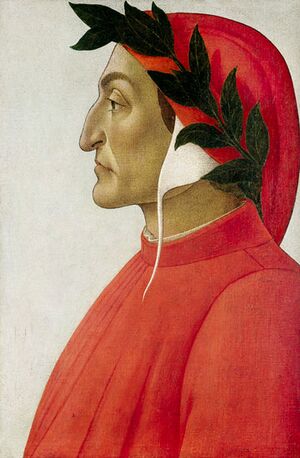Dante Alighieri
Foremost Italian poet of the late Middle Ages (b. around 1265 in Florence; d. September 1321 at Ravenna), born Durante degli Alighieri.
Dante is best known for his epic poem La Divina Commedia (Divine Comedy), written between c. 1310 and 1314, which is widely considered the greatest literary work composed in the Italian language and a masterpiece of world literature.
Tchaikovsky's Settings of Works by Dante
Tchaikovsky's orchestral fantasia Francesca da Rimini, Op. 32 (1876) was inspired by an episode in Canto V of the Inferno, from the first section of La Divina Commedia, which he had probably read in an abridged Russian translation by V. Petrov (Saint Petersburg, 1871). The manuscript score of the fantasia begins with a detailed programme:
Dante, accompanied by Virgil's ghost, descends into the second circle of the Hellish abyss. Here the walls echo with cries of despair. In the midst of the Stygian gloom is a fantastic storm. Violent, Hellish whirlwinds carry away tormented souls. Out of the countless spinning earthly spirits, Dante notices two in particular: Francesca and Paolo, who are locked in an embrace. Dante calls out to these tortured souls, and asks them for what terrible crimes they were being punished. Francesca's spirit, drenched with tears, recounts their pitiful tale. She was in love with Paolo, but against her will she was forced to marry the hateful brother of her beloved, the hunchbacked, twisted tyrant of Rimini. Despite his violent jealousy, he was not able to wrest Francesca's heart from her passion for Paolo. Together one day they read the story of Lancelot. "We were one", recounts Francesca. "And after reading this we no longer felt the fear and confusion that had marked our previous meetings. But that one moment destroyed us. By the time we reached Lancelot's first chance of love, nothing could now part us. In a moment of weakness we openly expressed our clandestine love for one another, throwing ourselves in each others arms". At this moment Francesca's husband returned unexpectedly, and stabbed her and Paolo to death. And after telling this, Francesca's spirit, and that of Paolo, were snatched away in the raging whirlwind. Overwhelmed by the endless suffering, Dante, completely exhausted, falls dead" — Inferno. Poem by Dante. Canto V [1].
The author's programme was also printed in the concert programme for the first performance of the fantasia in Moscow, but not in the published score, which was prefaced only by a few lines and a short quotation from Dante's poem.
Earlier in 1876, Tchaikovsky had considered a projected opera on the same subject. On 10/22 February 1876, Tchaikovsky wrote to Konstantin Zvantsev, asking for "a fresh copy of your charming libretto" [2]. According to Nikolay Kashkin, ‘Tchaikovsky was very interested in K. I. Zvantsev's libretto for Francesca da Rimini, carefully considered it, and was on the point of taking up composition of the opera, but the librettist suggested certain conditions, with which the composer could not agree. Their differences were not connected with the financial arrangements, but with the interference of the librettist in the composer's working methods. Pyotr Ilyich told me that K. I. Zvantsev was a fanatical admirer of Wagner, and he wanted the composer to write his Francesca in complete accordance with Wagner's reformist theories; he even wanted some kind of right of control for himself in this aspect" [3].
In the early 1880s Tchaikovsky also made three slightly different settings of Dante's words: "Nessun maggior dolore / Che ricordarsi del tempo felice / Nella miseria" ("There is no greater sorrow than to recall happiness in the midst of misery"), from Canto V (verses 121–123) of the Inferno. He adapted one of these settings in the opera Mazepa [4], and another as Astarte's theme in the Manfred Symphony; it is possible that the latter sketch was conceived with the symphony in mind.
In his correspondence, Tchaikovsky frequently quoted Dante's lines "Nessun maggior dolore..." when recalling happier times [5].
External Links
Notes and References
- ↑ Tchaikovsky mistakenly wrote 'Canto IV'.
- ↑ Letter 447 to Konstantin Zvantsev, 11/23 February 1876.
- ↑ Nikolay Kashkin, Воспоминания о П. И. Чайковском (1896), p. 123.
- ↑ In the duet for Mariya and Andrey, «И я, так ты, несчастна» ("And I, like you, am unlucky") (Act I, No. 2), and also in the orchestral introduction to Andrey's Arioso (Act III, No. 16), in which he recalls his family home and his love for Mariya.
- ↑ For example in Letter 481 to Modest Tchaikovsky, 3/15 July 1876, and Letter 3805 to Vladimir Davydov, 20 February/4 March 1889.

